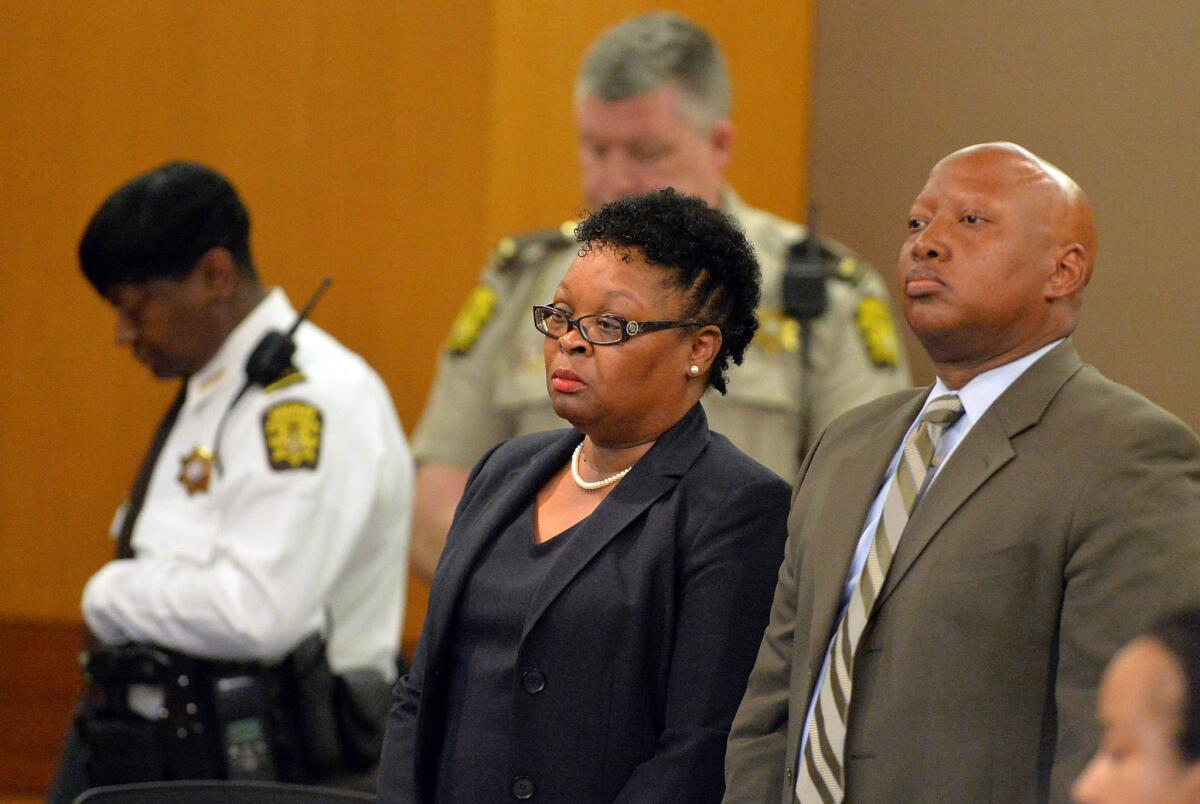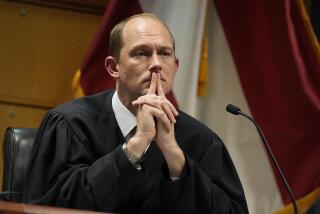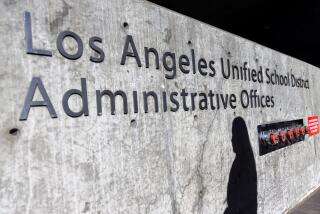Atlanta schools cheating scandal: 11 educators convicted of racketeering

Teacher Diane Buckner-Webb with attorney Kevin Franks after a jury found her guilty in the Atlanta schools cheating trial.
One of the largest school cheating trials in U.S. history drew to a dramatic close Wednesday with a jury finding 11 Atlanta elementary school teachers and administrators guilty of taking part in a racketeering conspiracy to illegally boost students’ test scores. Some of the educators face up to 35 years in prison.
Shock swept through the courtroom as the verdicts were announced, with defense attorneys for the majority of defendants rushing to seek bond for their clients.
“Now the rubber has met the road,” Fulton County Superior Court Judge Jerry W. Baxter said, noting that throughout the trial he had tried to persuade defendants of the seriousness of the charges. “They are now convicted felons, as far as I’m concerned. I don’t like to send anyone to jail … but they have made their bed and they’re going to lie in it.”
Ten of the convicted educators were led out of the courtroom in handcuffs. One, who is pregnant and weeks from her delivery date, was allowed to remain free on bond.
After eight days of deliberation, jurors in the landmark case found 11 of 12 defendants guilty of violating Georgia’s Racketeer Influenced and Corrupt Organizations Act, a charge that carries a sentence of up to 20 years in prison.
Some of the defendants were also found guilty of other felonies — influencing a witness, theft by taking, false swearing, or making a false statement or writing — that carry lesser sentences.
“I’m shocked and stunned,” said Gerald Griggs, a defense lawyer who represents Angela Williamson, a former elementary school teacher who was convicted of racketeering, plus two counts of false statements and two counts of false swearing. “The evidence in my client’s favor was strong, yet she now faces 35 years in prison.”
Only one educator, Dessa Curb, an elementary school teacher, was acquitted on all charges.
“I knew God had my back,” Curb told reporters outside the courthouse after the verdict was announced.
Her case was a little different from the others, her attorney Sanford Wallack noted, because the state’s erasure analysis contradicted what its own witnesses had said.
The jury’s verdict in the six-month trial presented a stunning outcome for those convicted. They face the possibility of decades in prison while scores of their former colleagues avoided jail time after confessing and accepting plea agreements. About 180 people were originally identified in the scandal.
“We’ve been fighting for the children in our community, particularly those children who were deprived by this cheating scandal,” Fulton County Dist. Atty. Paul Howard Jr. told reporters in a hastily arranged news conference. “Our entire effort in this case was simply to get our community to stop and take a look at our educational system.”
Sentencing hearings should take place in coming weeks, Howard said.
It was a major victory for prosecutors, who had presented thousands of pages of documents and called more than 130 witnesses in an attempt to demonstrate a pattern of widespread academic corruption in Atlanta’s public school system.
It is the first academic misconduct trial in the nation in which elementary school teachers were convicted of violating a RICO act, a law often associated with mobsters.
Legal experts had debated whether the state was overreaching, and even the judge who presided over the trial appeared to have misgivings. In December, Baxter told the court he was “somewhat doubtful” about whether the central racketeering charge would hold up and urged the two sides to come to an agreement, according to the Atlanta Journal-Constitution.
A lengthy state investigation, commissioned in 2009 by then-Georgia Gov. Sonny Perdue after suspicious jumps in tests, implicated at least 178 teachers and administrators in “organized and systemic misconduct” in 44 Atlanta elementary and middle schools. By 2011, more than 80 educators had confessed to test tampering — some immediately, and others later, in exchange for immunity from criminal prosecution.
In 2013, 35 educators were indicted, yet that number gradually dwindled as one defendant passed away and 21 pleaded guilty to lesser charges before the trial began. The alleged ringleader — former Supt. Beverly L. Hall — had her case severed from the others as she received chemotherapy for breast cancer. She died March 2.
Five elementary school teachers, two testing coordinators, an assistant principal, a principal and three superintendents insisted on their innocence and ended up going to trial. Prosecutors accused all 12 defendants of conspiring to change students’ answers on tests to ensure schools met new high-stakes testing goals. The evidence, one prosecutor claimed in closing arguments, was “overwhelming.”
During the trial, the jury of six men and six women heard scores of witnesses testify that educators had stolen exam booklets before tests, or met with other teachers after tests to change wrong answers. Some witnesses said they saw defendants cheating, including blatantly holding pencil erasers over test sheets.
Yet defense attorneys for each of the 12 defendants countered that prosecutors had failed to prove beyond a reasonable doubt that their clients had knowingly or willingly entered into any conspiracy.
Throughout, they questioned the moral credibility of the prosecution’s witnesses, arguing that many had admitted to cheating and received immunity in exchange for testifying, while others made contradictory statements or were driven by personal grievances.
In closing arguments, one attorney claimed prosecutors were operating according to a “Salem witchcraft mentality.” Another claimed the state’s use of unreliable witnesses was “a recipe for wrongful convictions.”
Asked if he thought the prosecution team was right to accept plea deals from so many of the 35 indicted educators, Howard said he believed the extent of witness testimony helped convince jurors that the racketeering accusations were “not some fantasy created by the DA’s office.”
“We absolutely did the right thing,” he said.
The Atlanta school cheating trial is the most extensive of recent cases that have troubled districts across the nation in the data-driven era of No Child Left Behind and Race to the Top. A 2013 report by the U.S. Government Accountability Office said that officials in 40 states detected potential cheating in tests given to public school students between 2010 and 2012.
Yet while some welcomed the Atlanta trial as a chance to resolve an episode that has roiled the city for nearly six years, others complained that teachers and administrators — all African Americans who worked in low-income neighborhoods — were being unfairly prosecuted using Georgia’s RICO statute.
“You could cut the tension in here with a butter knife,” one Fulton County sheriff’s deputy said to another as the prosecution team wrapped up its news conference and the courtroom gradually emptied.
Jarvie is a special correspondent reporting from Atlanta.
More to Read
Start your day right
Sign up for Essential California for news, features and recommendations from the L.A. Times and beyond in your inbox six days a week.
You may occasionally receive promotional content from the Los Angeles Times.







